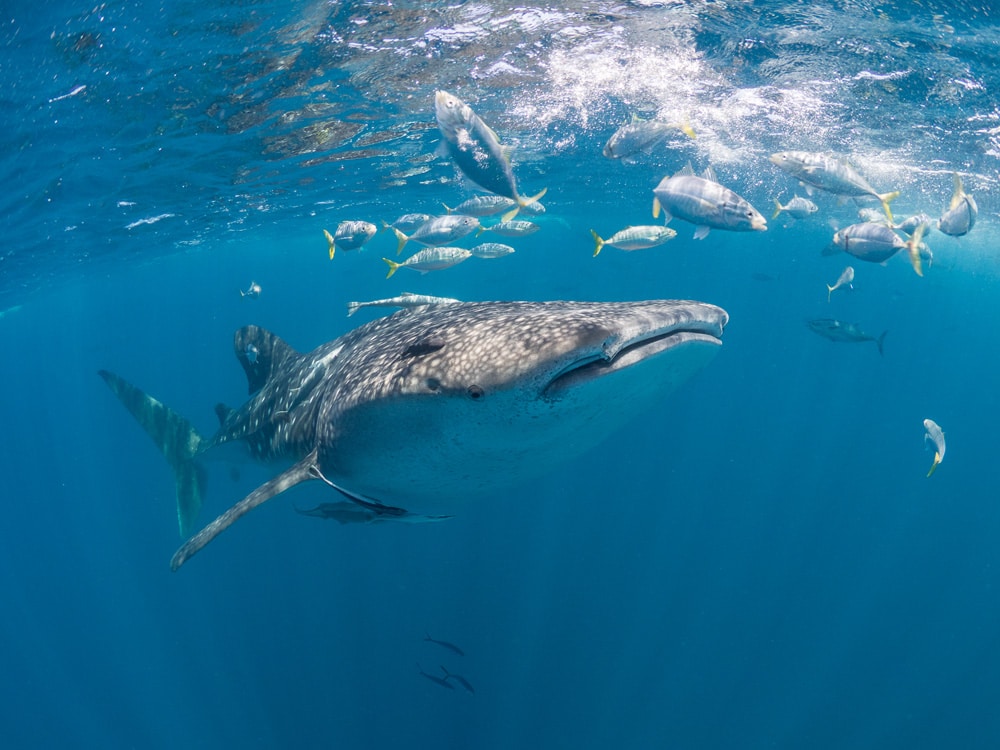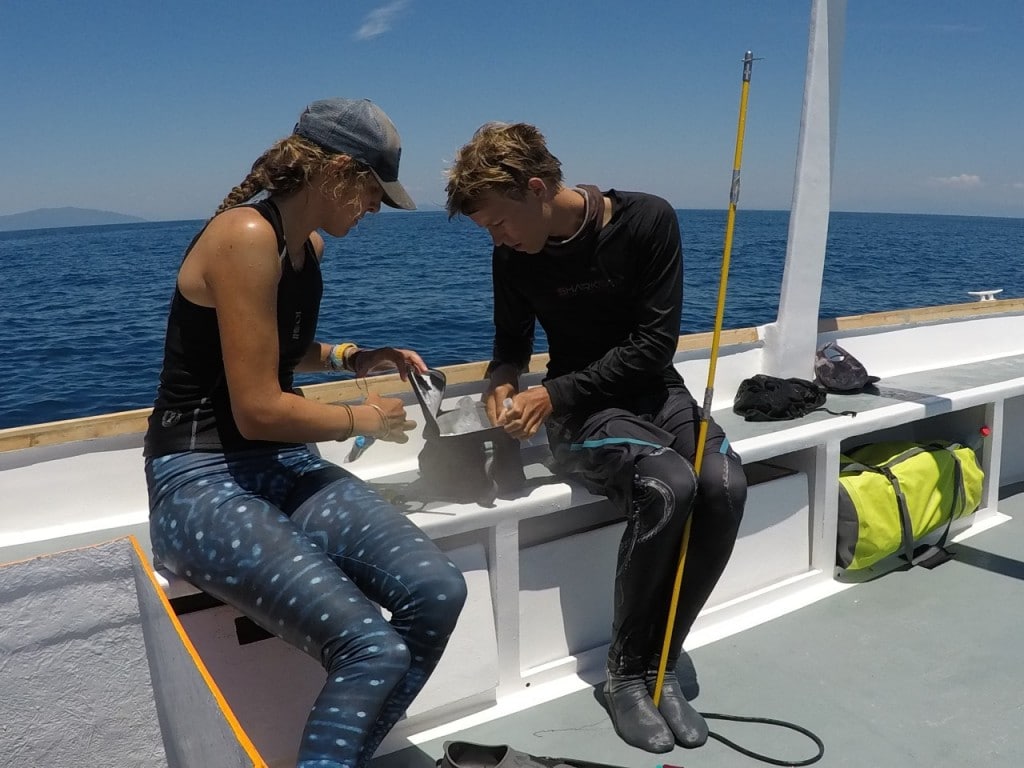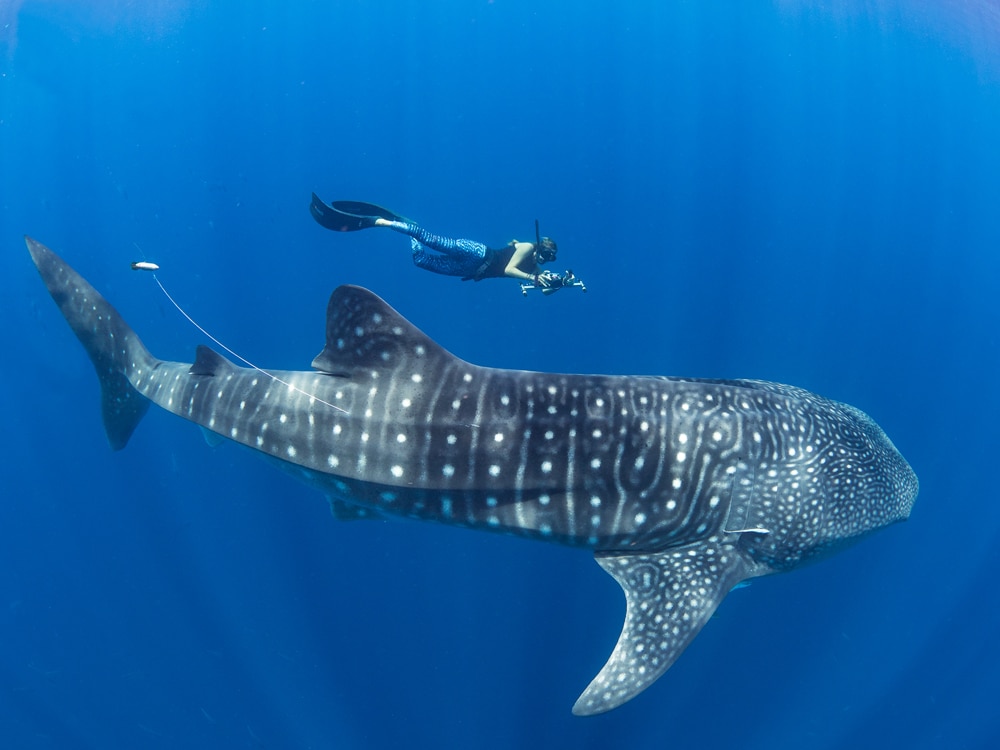News
Madagascar emerges as hotspot for endangered whale sharks

A new study published in the journal Endangered Species Research has revealed that juvenile whale sharks swim to Madagascar, a newly-identified hotspot for these huge fish, to feed. Eighty-five individual sharks were identified in a single season using photographs of their distinctive spot patterns. An isolated ‘island continent’, famed for animals and plants that exist nowhere else in the world, Madagascar’s nutrient-rich waters are also home to an incredible array of marine life attracting increasing numbers of tourists.
Whale sharks are primarily seen around the small island of Nosy Be, in northwest Madagascar. This area is a globally important hotspot for large marine species, including manta rays, sea turtles, humpback whales and even rare Omura’s whales. The study is part of the Madagascar Whale Shark Project, a collaboration initiated in 2016 by researchers from the Marine Megafauna Foundation, Florida International University, and Mada Megafauna.
Lead author and project leader Stella Diamant said: “We’ve found that whale sharks regularly visit Nosy Be between September and December. That has led to a growing ecotourism industry, as people travel to see and swim with these gigantic, harmless sharks. We’re still learning about their population structure and movement patterns, but it’s clear the area is an important hotspot for the species.”
Whale sharks are the largest fish in the world, growing up to 20 meters long. However, all of the sharks seen in Madagascar have been juveniles of less than nine meters.
“We identified 85 individual whale sharks over our first season in 2016. Some of the sharks were present across several months. They spend a lot of time in the area and seem to come here to feed,” Diamant said.
The marine biologists uploaded photographs of the sharks’ unique spot patterns to Wildbook for Whale Sharks (a global database of sightings) and compared them with data collected from known feeding areas in the Indian Ocean, including Djibouti, the Maldives, Mozambique, Seychelles and Tanzania, but found no overlap.
“Whale sharks are a globally endangered species due to overfishing, accidental catches and boat strikes. Major declines in sightings have been seen in Mozambique, where we’ve documented a 79% decline in sightings since 2005, and the Seychelles. I was hoping that some of those sharks might have shifted over to Madagascar”, said co-author Dr Simon Pierce, co-founder and principal scientist at the Marine Megafauna Foundation.
“Unfortunately, that doesn’t seem to be the case. It’s great news for Madagascar though. These sharks can be a major asset for the country. There’s already a good marine ecotourism industry developing”, he added.
As part of this study, the team attached eight satellite tags to immature whale sharks to track their movements in near real-time. They found that the sharks spent most of their time in shallow waters between 27.5-30°C around the tagging area in Nosy Be.
Half of the tagged sharks also visited a second hotspot near Pointe d’Analalava, 180 km south of Nosy Be. Five of the sharks swam over to Mayotte and the Comoros islands, and two swam right down to the southern end of Madagascar. One of those sharks then swam back to Nosy Be, a total track of 4,275 km. The sharks are slow-swimmers, travelling an average 21 km per day. Three sharks were resighted in the Nosy Be area the following season after having lost their tags.
“It was exciting to see that there is a second hotspot for the sharks in the area. We will be exploring the area later this year. Madagascar clearly provides an important seasonal habitat for these young whale sharks, so we need to ensure they are effectively protected in the country”, concluded Diamant.
Madagascar is a known location for shark fishing and finning. Whale sharks are currently afforded no formal protection except in two Marine Protected Areas located to the southwest and northeast of Nosy Be.
“Over the last decade, shark populations have declined dramatically in Madagascar due to overfishing. However, the most significant threat to this species is the incidental catch in coastal gillnets and industrial purse seiners operating offshore”, said Dr Jeremy J Kiszka, a marine biologist at Florida International University and co-scientific lead of the Madagascar Whale Shark Project.
Whale sharks are listed as ‘endangered’ on the IUCN Red List of Threatened Species since 2016 and received an Appendix I listing the UN Convention on Migratory Species in 2017. As a signatory to the Convention, Madagascar is obligated to protect the sharks and their migratory habitat in national waters.
The study was supported by Les Baleines Rand’eau, Aqua-Firma, PADI Foundation, IDEA WILD, Waterlust, the Shark Foundation, and two private trusts.
Stella Diamant, Christoph A Rohner, Jeremy J Kiszka, et al. ‘Movements and habitat use of satellite-tagged whale sharks off western Madagascar’ was published on 17 May 2018 and is available here.
For more information about Marine Megafauna Foundation please visit:
Website: www.marinemegafauna.org
Facebook: www.facebook.com/MarineMegafauna
Images by www.simonjpierce.com
Gear News
Introducing the TR-80, IR-50 and CS-30 Regulators from DYNAMICNORD

Whether you are a beginner or a professional diver – with the three new main regulators from DYNAMICNORD, everyone will find their favourite regulator. They all look super stylish.
Excellent performance with the TR-80
Quality and performance are the be-all and end-all for regulators. It is not for nothing that the TR stands for Tec Reg. The innovative design of the TR-80 guarantees absolute reliability – even in ice-cold waters.

Perfect breathing effort at 0.8 J/l / certified for diving in waters below 10 degrees / structural design made of solid brass for best cold protection / membrane-compensated design with dry seal of the first stage / reduced exhalation effort thanks to optimized exhalation membrane and bubble deflector / adjustable Venturi (dive/predive) and adjustment knob for individual inhalation comfort / innovative design of the front cover prevents free-flow in strong currents or when diving with scooters / design made of sandblasted brass, matt chrome finish / 2 HP and 4 LP outlets / mouthpiece made of high-quality, anti-allergic silicone for maximum comfort.


Amazing underwater adventures with the IR-50
The IR-50 is the top regulator for advanced and experienced divers. Natural breathing is the essence of this regulator.

Ideal breathing effort at 0.8 J/l /certified for diving in waters below 10 degrees / compensated membrane / adjustable venturi (dive/predive) and adjustment knob for individual inhalation comfort/ outlet valve and deflector for minimum exhalation effort and reduction of bubbles on the face / design made of sandblasted brass, matt chrome finish / 2 HP and 4 NP outlets / mouthpiece made of high-quality, anti-allergic silicone for maximum comfort.


The Workhorse – our CS-30
For diving centres and diving beginners – the workhorse stands for strong construction, reliability and robustness. Perfect for your training.

Optimal breathing effort at 0.8 J/l /recommended for diving in waters above 10 degrees / non-compensated piston / adjustable venturi (dive/predive) / outlet valve and deflector for minimum exhalation effort and reduction of bubbles on the face / design made of sandblasted brass, matt chrome finish / 1 HP and 3 NP outlets / mouthpiece made of high-quality, anti-allergic silicone for maximum comfort.


Octopus OP-30
The OP-30 is the ideal addition to all DYNAMICNORD regulators. It is identical in construction to the CS-30.

The TR-80, IR-50, CS-30 (DIN & INT) regulators and the Octopus OP-30 are available from DYNAMICNORD dealers and in the online store.
DYNAMICNORD – Your Outdoor Companion.
Marine Life & Conservation
Paul Watson Released as Denmark Blocks Japan’s Extradition Bid

Renowned anti-whaling activist Paul Watson has been released from custody in Greenland after spending five months in detention. Denmark’s Justice Ministry rejected Japan’s request for his extradition, citing insufficient guarantees that his time already served in custody would be credited against any potential sentence.
The 74-year-old Canadian-American was arrested on July 21 in Nuuk, Greenland’s capital, when his ship docked to refuel. His arrest was based on a 2012 Japanese warrant related to a 2010 encounter in Antarctic waters. Japan alleged Watson obstructed operations and caused damage to a whaling research ship during efforts to disrupt illegal whaling. Watson has consistently denied these claims, maintaining his commitment to marine conservation.
Denmark, which oversees extradition matters for Greenland, concluded that while the legal conditions for extradition were met, the lack of assurances from Japan regarding time-served credit made extradition untenable.
In a video shared by his foundation, Watson expressed gratitude and relief, saying, “After five months, it’s good to be out… and good to know they’re not sending me to Japan.” He added that the most difficult part of his time in custody was being separated from his two young sons.
Watson is a pioneering figure in marine conservation, known for founding the Captain Paul Watson Foundation in 2022 after decades of activism with the Sea Shepherd Conservation Society. His bold efforts to defend marine life have earned him widespread support, including from celebrities and conservationists. His work has also been featured in the acclaimed reality TV series Whale Wars.
Watson’s lawyer, Jonas Christoffersen, praised the decision, stating, “We are happy and relieved that Paul Watson is now free.” He added that Watson is eager to reunite with his family and continue his vital work.
The arrest occurred while Watson’s vessel, the M/Y John Paul DeJoria, was en route to the North Pacific with a team of 26 volunteers to intercept a Japanese whaling ship. His foundation described the arrest as politically motivated and emphasized that Watson’s actions were focused on ending illegal whaling practices.
Japan resumed commercial whaling in 2019 after leaving the International Whaling Commission, asserting that whale meat is a cultural tradition. Conservationists, however, continue to challenge these practices, highlighting their impact on marine ecosystems.
Despite the challenges, Watson remains steadfast in his mission to protect marine life and bring attention to whaling practices. His dedication to ocean conservation has made him a globally respected advocate for the environment.
-

 News2 months ago
News2 months agoIconic SS United States to become the World’s Largest Artificial Reef
-

 News3 months ago
News3 months agoBook Review – 52 Assignments: Underwater Photography
-

 Gear News3 months ago
Gear News3 months agoDYNAMICNORD – New German diving brand enters the British market
-

 News3 months ago
News3 months agoExploring Cenote El Pit: A Diver’s Dream
-

 Gear News3 months ago
Gear News3 months agoTry BARE drysuits (and maybe even win one!) this Friday with Sea & Sea at North West Dive Fest
-

 Marine Life & Conservation3 months ago
Marine Life & Conservation3 months agoBook Review: Coral Triangle Cameos
-

 Blogs2 months ago
Blogs2 months agoDive the Egyptian Red Sea this Autumn with Regaldive
-

 News3 months ago
News3 months ago2024 Ocean Art Underwater Photo Competition Announced


















